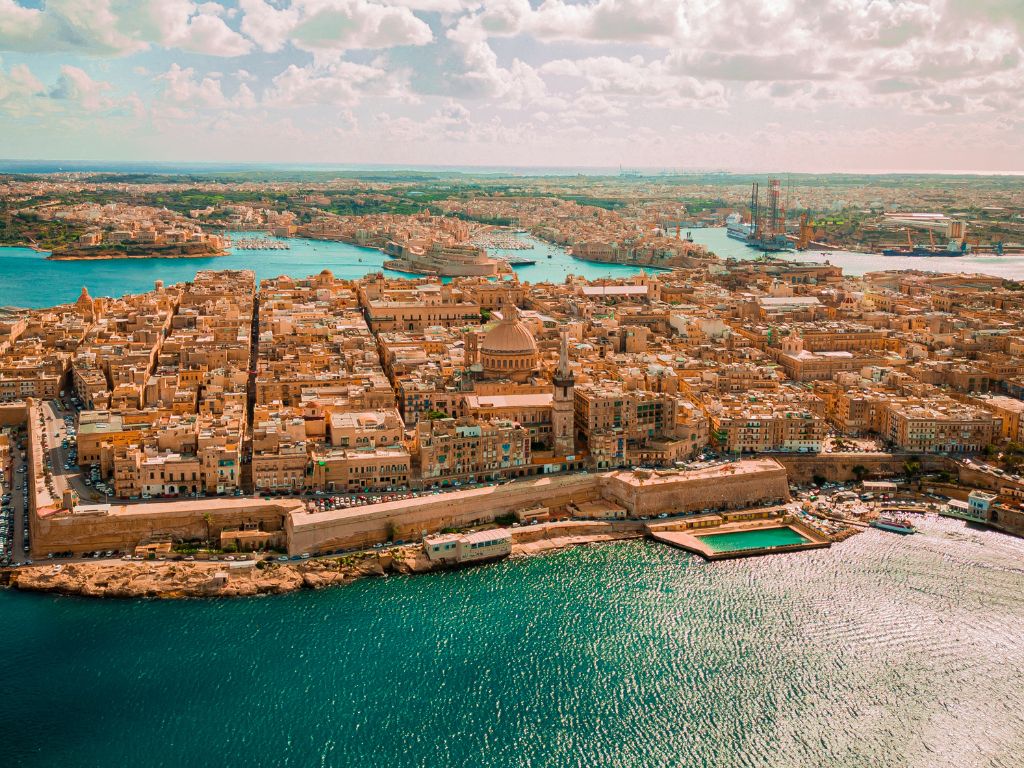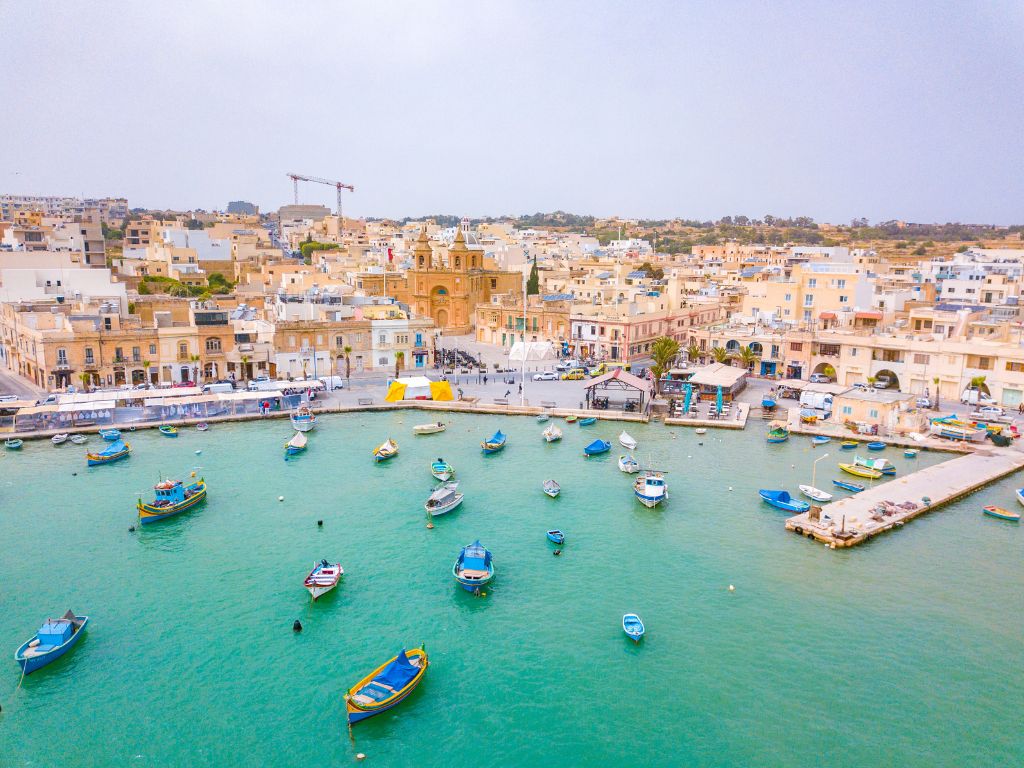- Miami
- Lisbon
- Dublin
- Dubai
- Cebu
Insights
Malta is an extremely attractive proposition for anyone interested in pursuing a citizenship or residence by investment program. Perfectly placed in the Mediterranean Sea with easy access to anywhere in Europe, this idyllic island nation offers Schengen Zone access with its passport, as well as a strong base of operations in the heart of the Old World.
As mentioned, Malta has two options when it comes to investment – residence or citizenship. We’ll be taking a look at both of these options – what the requirements are, what the benefits are, and any other relevant information pertaining to one or both.
A small cluster of islands in the Mediterranean Sea, Malta might possibly be the most attractive destination in the world – aesthetically, financially and geographically – for those looking for either residence or citizenship by investment.
Malta has one of the highest standards of living in Europe. It has a very high GDP, a very low crime rate, and is an extremely desirable place to live by anybody’s standards.
Beyond that, should you go the citizenship route (as opposed to residency) you’ll have one of the most powerful passports in the world. According to top Passport Ranking Sources, Malta’s passport is – jointly – the fourth most powerful in the world, with access to 188 countries worldwide. You’ll also have unlimited access to the much-coveted Schengen Zone.
Let’s take a more detailed look at the two investment options on offer.
Malta’s citizenship by investment program is as attractive as it is costly. It’s also fairly unique among CBI programs, in that it has a genuine residence requirement – something not found in any comparable program elsewhere.
Acquiring Maltese citizenship is more difficult than acquiring citizenship via any other CBI program (as we’ll get to later). However, the benefits are commensurately higher, and – for many – well worth the price of admission.
Becoming a Maltese citizen comes with no end of benefits. Let’s examine some of the biggest.
One of the most coveted travel privileges of any passport, access to the Schengen Zone is a major selling point of any CBI program. As Malta is an EU member, unrestricted Schengen Zone access is a given. No need to apply for visas, and no restriction on how long you can stay.
A Maltese passport offers visa free travel to almost every country in the world, including the United States, Canada, Australia, New Zealand and a majority of nations in Asia, Africa and South America.
When applying for citizenship by investment, you’re not just limited to yourself. You can include your spouse, children, parents, and grandparents on your application (with a fee applicable for each dependant). Furthermore, future generations of your family will automatically inherit Maltese citizenship.
Maltese passport holders are not just restricted to traveling in the EU – they are also able to live and work there as they please. This, it almost goes without saying, is a massive plus of Maltese citizenship in comparison with other countries offering CBI programs.
Free universal healthcare and access to free higher education are standard in Malta. Combined with the high standard of living, it’s not hard to see why it’s such an eminently desirable destination.
As the old adage goes, you get what you pay for. Malta’s CBI program offers some truly excellent advantages – but that comes with some stringent requirements.
In order to apply for Maltese citizenship, you must be a “third-country national” – that is to say, not from an EU or EEA country, and not from Switzerland.
You must have a clean criminal record, and you must not be considered to be a potential threat to national security. You must also not be subject to ongoing criminal proceedings.
When applying for citizenship by investment there are, by definition, certain investment requirements that need to be satisfied. Unlike many other CBI programs, there is not a choice of various investment options from which you can select; all of the following requirements must be satisfied.
The requirements are as follows:
The Malta Permanent Residence by Investment Program (often abbreviated to ‘MPRP’) is a fast-track residence program, often called a ‘golden visa’, which offers permanent residency as soon as you’ve been accepted and does not need to be renewed.
Permanent Maltese residence might initially seem like less of a good deal than the country’s CBI program, but it does have its plus points – as we’ll soon see.
It’s tempting to assume that permanent residence is not as appealing as citizenship for most people. The fact is, however, that there are a great many benefits to the MPRP, as we’ll see below:
Once you’ve successfully been accepted onto the MPRP, you – along with any of your dependents – will have residence for life. There’s no need to reapply or renew anything – it’s a permanent residence permit.
With permanent Maltese residence, you and your dependants will be able to travel within the Schengen Zone as much as you like.
Obtaining Maltese residence is a path to EU long-term residency (LTR), which itself confers a whole host of rights.
These include access to employment (including self-employment), social protection and assistance within the EU, the right to education and vocational training, and, under certain conditions, the right to move from one EU state to another.
After five years, residents of Malta are entitled to apply for full citizenship. Note however that eligibility does not guarantee a successful application.
Maltese residents are eligible to apply for a work permit (note that this is a separate application procedure and that residence does not guarantee permission to work).
Similarly to Malta’s CBI program, there are a number of requirements that must be satisfied before you can become a permanent resident of Malta. Detailed information on each requirement can be found below.
As with the CBI program, applicants must not be a national of an EU/EEA country or Switzerland.
You must have a certificate of good health from a “reputable health system”.
You must have capital of €500,000, €150,000 of which must be “financial assets”. You must also have a “stable and regular source of income”.
You must have a completely clean criminal record, must not be considered a threat to the national security of Malta, and must not be subject to current criminal proceedings.
Unlike the CBI requirements, Malta’s Permanent Residency Program has two ways in which you can contribute: a “full contribution option” and a “reduced contribution option”.
With this option, applicants are required to make all of the following:
Contrary to its name, the Reduced Option Contribution requires an even larger investment on your part. This is because while the overall amount invested is larger, the government contribution is smaller.
The required investment amounts are as follows:
It is possible to pursue rental or purchase properties elsewhere in Malta. In this instance, the amount payable increases to €12,000 per annum (for rentals) or €350,000 (for a purchased property).

When considering your options vis-à-vis Maltese investment, it will quite often boil down to a single dividing factor: cost.
Citizenship by investment is, by almost all parameters, the superior option. Maltese citizenship opens doors that permanent residency does not – namely complete freedom of movement in the Schengen Zone, including the ability to work and live in any country that falls under that umbrella. You’ll also have access to the world’s fourth most powerful passport – something that is most certainly not to be sniffed at.
But citizenship does come with a hefty price tag. Obtaining citizenship by investment is going to cost you anywhere from €1-€1.5 million – far more than the MPRP, and much more than most other comparable CBI programs.
Conversely, MRPP doesn’t open quite as many doors – you cannot work or live in the EU, and you are not guaranteed the right to work in Malta itself – but it’s far more affordable. You can obtain permanent residence for as little as €150,000, and permanent residence allows you to apply for citizenship in five years’ time.
Both options have their merits, and it’s ultimately for you to decide which is the best for you. Assess your options, weigh up the pros and cons, and choose the program that best serves the interests of you and your family. Vancis Capital’s experienced Global Client Advisors can assist you with evaluating your requirements and discussing these options with you in further details.

When considering your options vis-à-vis Maltese investment, it will quite often boil down to a single dividing factor: cost.
Citizenship by investment is, by almost all parameters, the superior option. Maltese citizenship opens doors that permanent residency does not – namely complete freedom of movement in the Schengen Zone, including the ability to work and live in any country that falls under that umbrella. You’ll also have access to the world’s fourth most powerful passport – something that is most certainly not to be sniffed at.
But citizenship does come with a hefty price tag. Obtaining citizenship by investment is going to cost you anywhere from €1-€1.5 million – far more than the MPRP, and much more than most other comparable CBI programs.
Conversely, MRPP doesn’t open quite as many doors – you cannot work or live in the EU, and you are not guaranteed the right to work in Malta itself – but it’s far more affordable. You can obtain permanent residence for as little as €150,000, and permanent residence allows you to apply for citizenship in five years’ time.
Both options have their merits, and it’s ultimately for you to decide which is the best for you. Assess your options, weigh up the pros and cons, and choose the program that best serves the interests of you and your family. Vancis Capital’s experienced Global Client Advisors can assist you with evaluating your requirements and discussing these options with you in further details.

When considering your options vis-à-vis Maltese investment, it will quite often boil down to a single dividing factor: cost.
Citizenship by investment is, by almost all parameters, the superior option. Maltese citizenship opens doors that permanent residency does not – namely complete freedom of movement in the Schengen Zone, including the ability to work and live in any country that falls under that umbrella. You’ll also have access to the world’s fourth most powerful passport – something that is most certainly not to be sniffed at.
But citizenship does come with a hefty price tag. Obtaining citizenship by investment is going to cost you anywhere from €1-€1.5 million – far more than the MPRP, and much more than most other comparable CBI programs.
Conversely, MRPP doesn’t open quite as many doors – you cannot work or live in the EU, and you are not guaranteed the right to work in Malta itself – but it’s far more affordable. You can obtain permanent residence for as little as €150,000, and permanent residence allows you to apply for citizenship in five years’ time.
Both options have their merits, and it’s ultimately for you to decide which is the best for you. Assess your options, weigh up the pros and cons, and choose the program that best serves the interests of you and your family. Vancis Capital’s experienced Global Client Advisors can assist you with evaluating your requirements and discussing these options with you in further details.
Get in touch to discuss how we can help you with your citizenship or residency by investment goals. One of our investment migration experts will contact you to discuss your case. With over 16 years of combined experience our team has helped hundreds of families achieve freedom.
121 Alhambra Plaza
Suite 1029
Coral Gables, FL 33134
USA
Office 134
The Chase
Sandyford Industrial Estate
Dublin, Ireland
5 Rua do Carmo
3rd Floor
1200-093 Lisbon
Portugal
Office No. 1911
B2B Tower
Marasi Drive
Business Bay
Dubai, UAE
Level 11, Unit 1
AppleOne Equicom Tower
Cebu Business Park
Cebu City, Philippines
© 2025 Vancis Capital. All right reserved